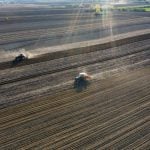Soybean acreage in Manitoba has fallen short of early expectations as cool temperatures, wet weather and flooding caused farmers to think twice about planting the crop.
Through the winter and early spring there had been talk that Manitoba farmers would seed up to 400,000 acres of soybeans this year, weather permitting. There were indications of attractive new-crop pricing opportunities and expensive input costs.
Pulse specialists with Manitoba Agriculture, Food and Rural Initiatives (MAFRI) have since lowered their acreage estimate considerably, in light of unfavourable spring planting conditions.
Read Also

India slaps 30 per cent import duty on yellow peas
India has imposed a 30 per cent duty on yellow pea imports with a bill of lading date on or after Nov. 1, 2025.
Soybean acreage in the province is now expected to fall somewhere around 260,000, according to Bruce Brolley, a MAFRI pulse crop specialist at Carman, Man. That compares to the 313,000 acres planted last spring.
“It’s been a very hard year to estimate how many acres went into the ground because of the Interlake situation and the flooding and rains in the Red River Valley. Everyday we get better numbers but we won’t have a really hard figure until the end of July,” Brolley said.
Soybeans which were planted toward the end of May — the majority this year — are one to two leaf stages behind normal development, but there is no reason for concern, Brolley said.
Anything planted before that, around mid-May, is in the second trifoliate stage.
“We’re really encouraged by the recent weather. With the heat and humidity that we saw last week, the plants just jumped. Soybeans just love this temperature,” Brolley said.











